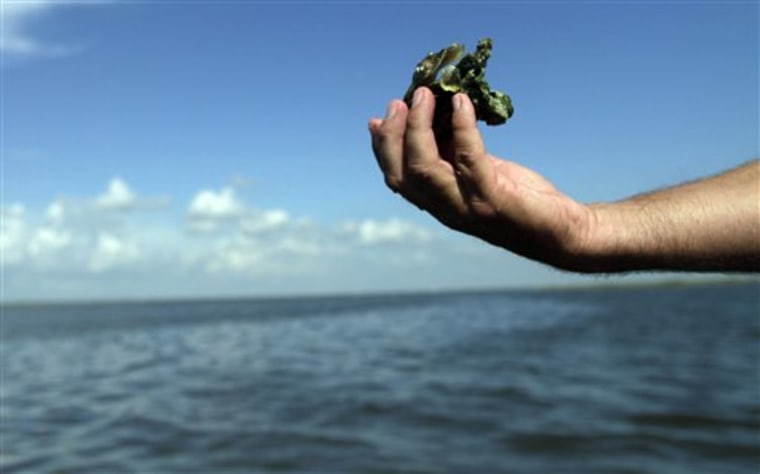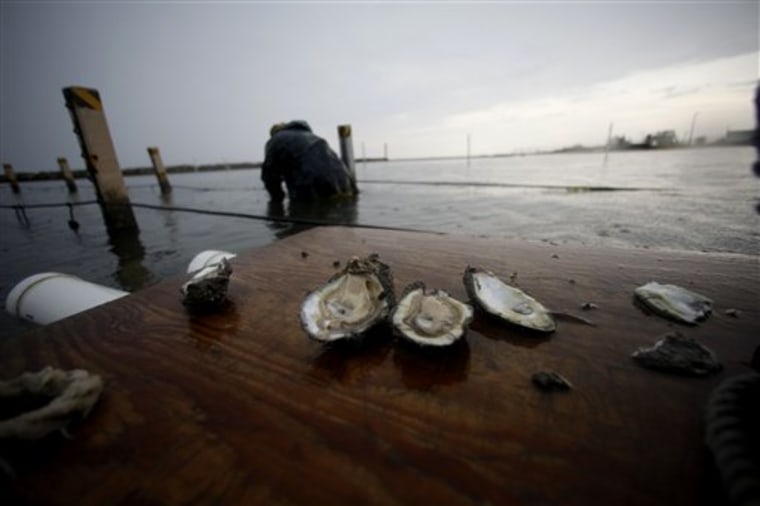Mississippi oystermen can't seem to catch a break.
Over the years, the industry has been damaged by Hurricane Katrina, cheap imports, high gas prices and the perception Gulf oysters weren't safe to eat because of the BP oil spill.
Now, the upcoming harvest season may be lost. Oysters, which thrive in salt water, are dying in large numbers because of the fresh water that poured in from spillways opened to take pressure off levees protecting cities from the rising Mississippi River this summer.
The oyster harvest, which usually runs from October to April, could be restricted or canceled altogether to give the oysters a chance to recover.
"Giving the entire reef a break for this season would be an option," said Joe Jewell, assistant director of fisheries for the Mississippi Department of Marine Resources.
The agency expects to make its recommendation next month; the final decision is with a five-member commission appointed by the governor to represent seafood processors, environmental organizations, charter boat operators and fishermen.
Oystermen, seafood processors and restaurants that cater to customers who enjoy the local catch are waiting in agony.
'Domino impact'
Jerry Forte, a Pass Christian seafood dealer who mainly sells shrimp and oysters to shops, said he won't make any money if the oyster harvest is a wash.
"You can't survive on nothing," Forte said. "Your bills still come in, but you don't make no money."
Jennifer Jenkins, a manager at Crystal Seas Oysters in Pass Christian, which processes oysters and supplies them to restaurants, said her business was already off roughly 25 percent. And the company is still fighting for money from the fund set up by BP PLC to compensate victims of last year's oil spill.
"We haven't had a normal year here since Katrina," Jenkins said. The hurricane struck Aug. 29, 2005, wiping out vast stretches of the Mississippi coast in addition to the horrific damage done to New Orleans.
Crystal Seas Oysters can pull oysters from its dock in Louisiana and buy oysters in Texas, but some customers prefer to buy locally harvested oysters, Jenkins said. And, she added, "once you start paying freight, it's just a bigger expense to incur."
Forte said he doesn't even "fool with out-of-state oysters because you can't make any money like that."
"You just try to keep your head above water until times are better," Forte said.
Oysters are a stationary species, and that is why they were hit hard when record amounts of fresh water headed down the Mississippi River were diverted into Lake Pontchartrain and from there into Mississippi Sound after the Bonnet Carre Spillway in Louisiana was opened in May. Shrimp, finfish and crabs are mobile and can seek saltier water, so they weren't affected as much.
"When one of these events occur, it causes a domino impact through the fisheries," Jewell said. "The oyster fishermen tend to feel those impacts much more than any other components of the seafood industry."

Jewell said field crews have been out in recent weeks assessing the impact on Mississippi oyster beds. They have reported a 50 percent to 65 percent mortality rate in some areas, and a 90 percent to 95 percent mortality rate in others. Pass Christian has seen an impact, while the most significant impact has been on the reefs in the far western Mississippi Sound, including the St. Joe and Waveland areas, Jewell said.
"In the years to come, nature is healing itself and there may be the potential for next year to have an increased harvest," he said. "But this year coming, we're going to see a significant reduction in harvest. There's no way around that."
'Throw your hands up in the air'
In an average year, the harvest in Mississippi produces roughly 300,000 to 350,000 sacks of oysters, according to Jewell. With no major production during the oil spill because of the perception beds were tainted, only about 35,000 to 40,000 sacks were harvested last fall, he said.
Other options could be to have a limited season, allow both dredging and tonging but with restricted sack limits, or perhaps not allow dredging. Tonging involves using a set of tongs to scoop oysters off the bottom of the Mississippi Sound. Dredging involves using a basket attached to a toothed bar. The basket is dragged by boat over a reef and oysters are scraped off the bottom by the bar, caught in the basket, and then hauled aboard a boat, according to the DMR's website.
In Louisiana, officials took precautions to try to limit the damage to oyster beds there. They closed two oyster harvesting areas that were receiving large amounts of fresh water intrusion. They also announced that oysters in some areas east of the Mississippi River could be relocated from beds that were to be inundated with fresh water to other seed grounds or oyster leases out of the way of the flood waters coming through. A special permit was required.
Roughly 13 million pounds of oysters are harvested in Louisiana in an average year, according to the Louisiana Department of Wildlife and Fisheries. Oyster beds saw a substantial impact from the fresh water, though official mortality numbers are not available yet, spokeswoman Olivia Watkins said. The process of evaluating the situation there is continuing.
Byron Encalade, president of Louisiana Oystermen's Association, said he believes coastal erosion and the oil spill had a much greater impact on oyster harvesting in southern Louisiana than the recent fresh water did.
Back in Pass Christian, along the Gulf of Mexico, residents and businesses have experienced numerous shocks in recent years to the fragile oyster industry.
"At some point in time you just throw your hands up in the air and say, 'We're going to do this again?'" Jenkins, the Crystal Seas Oysters manager, said with a laugh.
